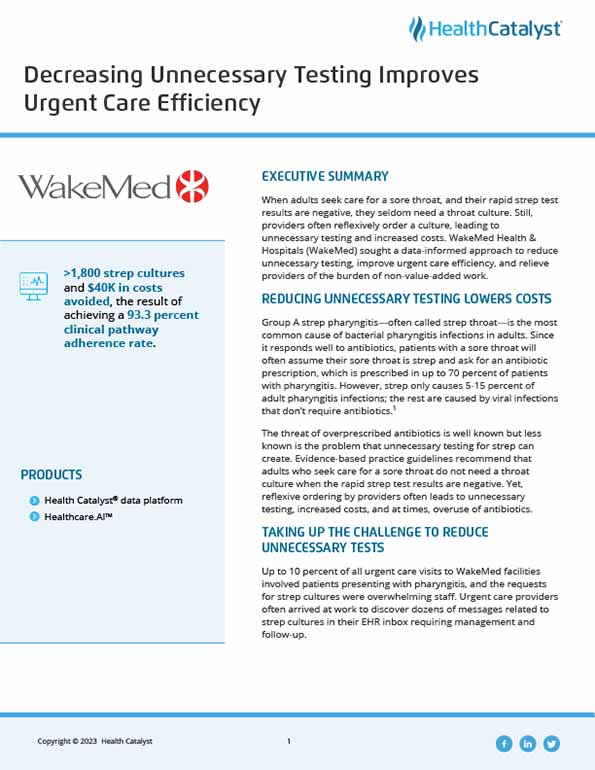When adults seek care for a sore throat, and their rapid strep test results are negative, they seldom need a throat culture. Still, providers often reflexively order a culture, leading to unnecessary testing and increased costs. WakeMed Health & Hospitals (WakeMed) sought a data-informed approach to reduce unnecessary testing, improve urgent care efficiency, and relieve providers of the burden of non-value-added work.
Group A strep pharyngitis—often called strep throat—is the most common cause of bacterial pharyngitis infections in adults. Since it responds well to antibiotics, patients with a sore throat will often assume their sore throat is strep and ask for an antibiotic prescription, which is prescribed in up to 70 percent of patients with pharyngitis. However, strep only causes 5-15 percent of adult pharyngitis infections; the rest are caused by viral infections that don’t require antibiotics.1
The threat of overprescribed antibiotics is well known but less known is the problem that unnecessary testing for strep can create. Evidence-based practice guidelines recommend that adults who seek care for a sore throat do not need a throat culture when the rapid strep test results are negative. Yet, reflexive ordering by providers often leads to unnecessary testing, increased costs, and at times, overuse of antibiotics.
Up to 10 percent of all urgent care visits to WakeMed facilities involved patients presenting with pharyngitis, and the requests for strep cultures were overwhelming staff. Urgent care providers often arrived at work to discover dozens of messages related to strep cultures in their EHR inbox requiring management and follow-up.
WakeMed providers recognized that the number of tests ordered was high, and urgent care leaders engaged with leaders in the laboratory, seeking to understand the work burden associated with strep cultures. The laboratory confirmed that hundreds of strep cultures were clinically unnecessary, burdening an already busy microbiology laboratory. WakeMed needed to decrease unnecessary testing and ensure its patients received the timely, high-quality care they needed.
WakeMed designed an evidence-based care pathway to improve the management of patients with acute pharyngitis and decrease unnecessary testing, establishing a goal to achieve at least 90 percent pathway adherence. With the new care pathway, adult patients who present to urgent care with strep-like symptoms receive a rapid strep test. The provider initiates the strep treatment if the rapid strep test is positive. If the rapid strep test is negative, group A strep is ruled out, and additional culture is not indicated in most circumstances.
The organization shared this new care pathway with its providers at staff meetings and throughout implementation, ensuring each provider knew the current evidence-based practice guidelines and the rationale behind the clinical pathway. The medical director or supervising physician provided one-on-one education and followed up with providers that did not meet pathway adherence goals.
To visualize, understand, and monitor the adoption of the care pathway, WakeMed leverages the Health Catalyst® data platform and a robust suite of analytics applications, including Healthcare.AI™. WakeMed uses the high-valued data and analytics from the analytics platform to engage providers in changing behavior and adopting the new pathway. Healthcare.AI enables leaders to draw more accurate and consistent conclusions, and to do so more quickly. Using pathway adoption data, WakeMed can determine the impact of the care pathway on patient outcomes, and can evaluate any unintended impacts by monitoring the number of patients returning to urgent care within five days of the previous visit.
WakeMed’s data-informed improvements have reduced unnecessary testing and improved urgent care efficiency, relieving providers of the burden of non-value-added work.
In addition to improving provider confidence, decreasing unnecessary testing for strep pharyngitis has helped reinforce antibiotic stewardship principles for managing pharyngitis, and decreased the lab/microbiology workload associated with unnecessary strep cultures.
"Our data-informed improvement approach successfully addressed questions that had led to some resistance, improved adherence to the evidence-based care pathway, and decreased unnecessary testing."
- Christopher Chao, MD, Urgent Care, WakeMed Health & Hospitals
WakeMed plans to expand this successful, data-informed improvement approach to address other clinical scenarios in ambulatory care. The organization also plans to manage the number of potentially unnecessary urine cultures.


